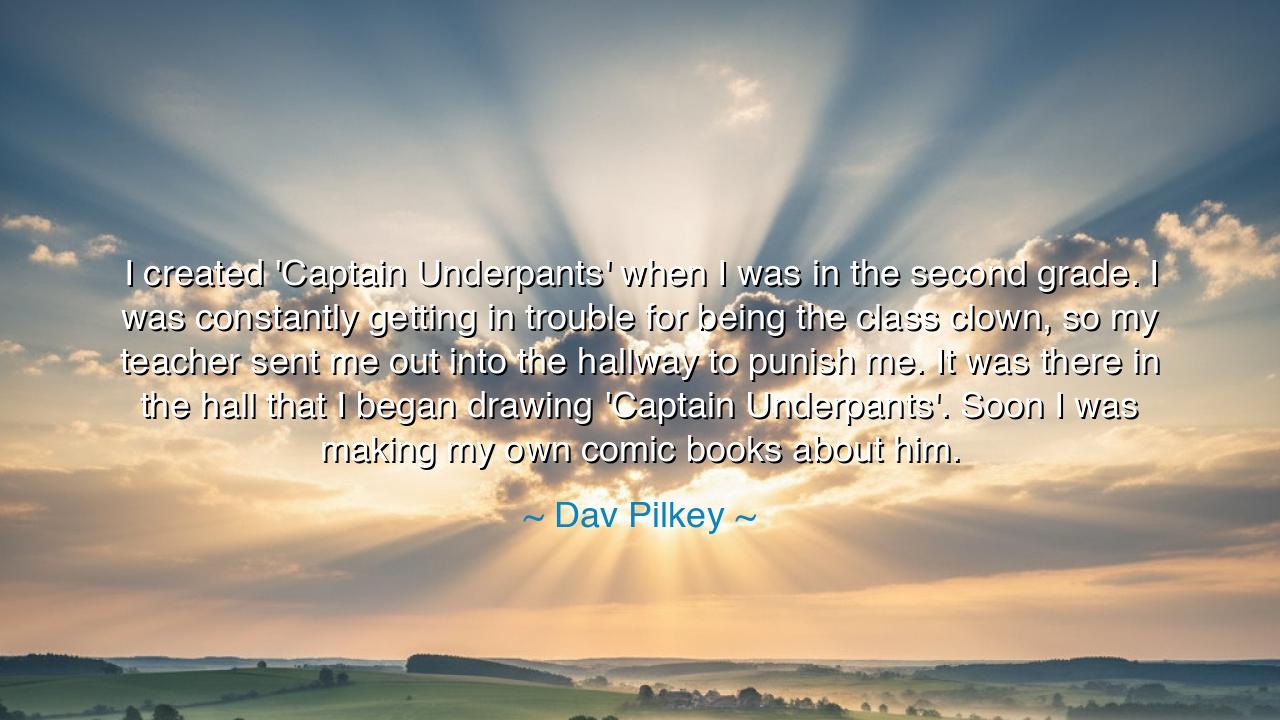
I created 'Captain Underpants' when I was in the second grade. I
I created 'Captain Underpants' when I was in the second grade. I was constantly getting in trouble for being the class clown, so my teacher sent me out into the hallway to punish me. It was there in the hall that I began drawing 'Captain Underpants'. Soon I was making my own comic books about him.






Hear now the tale of Dav Pilkey, who in his youth, while yet a child of the second grade, gave life to a hero most unlikely—Captain Underpants. His words bear a truth greater than mere remembrance, for they reveal how hardship, chastisement, and ridicule may become the soil from which creativity and triumph arise. The hallway of punishment, where he was cast aside for his mischief, became not a place of exile, but a temple of discovery. There, alone with his thoughts and pen, the boy transmuted shame into laughter, discipline into invention, and sorrow into joy. Thus the child, in the silence of correction, forged the seed of his destiny.
In the manner of the ancients, let us consider what this tale whispers to our spirits. The world often seeks to restrain those who burn with imagination, casting them away for disrupting order. Yet within the very exile lies the fire of greatness. For what is creativity if not rebellion against silence? What is invention if not a song sung where none expected melody? Pilkey’s drawing of a foolish hero clad in undergarments was no mere jest; it was the outcry of a soul refusing to be bound by the chains of punishment. And so the punishment became blessing, and the hallway became sanctuary.
Recall, if you will, the story of the Greek philosopher Diogenes, who dwelt not in palaces but in a barrel. Cast off by society, mocked by the respectable, he transformed rejection into wisdom. He, like Pilkey, turned the place of exile into the throne of originality. In the eyes of the world, both were fools; yet in the fullness of time, the laughter they sparked revealed deeper truths than solemn faces dared to speak. In their foolishness, wisdom was hidden, and in their disgrace, a path to immortality was carved.
The words of Pilkey remind us also of the great Thomas Edison, who as a child was told by teachers that he was “addled” and unfit for learning. Cast aside, his mother drew him back to faith in himself, and in that private space, away from the judgment of classrooms, he began to fashion the genius that would bring light to the world. Even as Pilkey turned a hallway into a realm of creation, Edison turned rejection into fuel, proving that destiny often dwells in the hearts of those the world misunderstands.
Therefore, let us see in Pilkey’s testimony the eternal lesson: that the walls meant to confine us may become the canvas of our becoming. Obstacles are not prisons but thresholds. Every rejection may conceal an invitation to invent, every exile may contain a hidden workshop where the soul may labor freely. One must not despair when cast out, but ask instead: “What great thing may I forge here, in this space where none expected greatness?”
O children of tomorrow, take this teaching into your marrow. When others scorn your laughter, do not let your spirit wither. When the world silences your song, let your heart become the harp that no man can mute. When life places you in its hallways of loneliness, boredom, or punishment, take up your pen, your brush, your instrument, or your voice, and let creation flow forth. For it is in such places, hidden from the crowd, that destiny waits to be summoned.
Let us then, with courage, choose creation over complaint, and imagination over despair. Each man and woman must craft their own “Captain Underpants”—their vision, their invention, their laughter to gift the world. Begin where you are, with what you have, even in the narrow halls of trial. And when you do, remember the boy in the hallway, and know that even from scorn may rise legends that will endure for generations.
Thus the final word is this: embrace the places of exile as sacred ground, for they are not the tombs of your spirit, but the wombs of your destiny. Go forth, then, and in your own life turn punishment into power, rejection into rebirth, and silence into song. In this way, you, too, may leave behind a gift that endures beyond your years.






AAdministratorAdministrator
Welcome, honored guests. Please leave a comment, we will respond soon